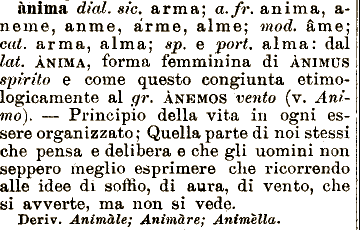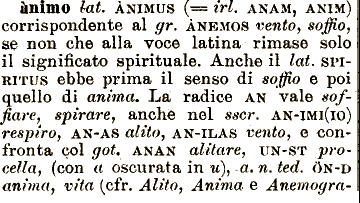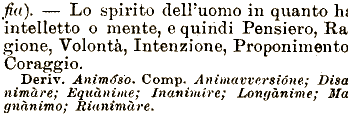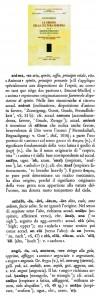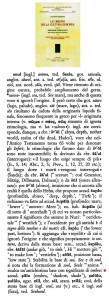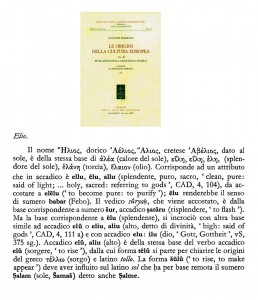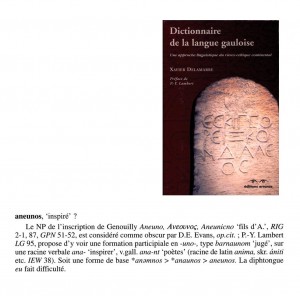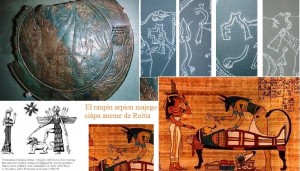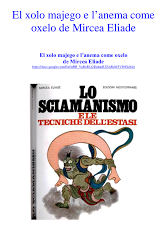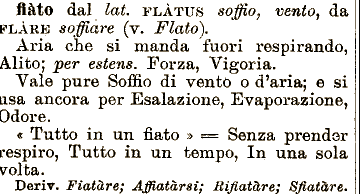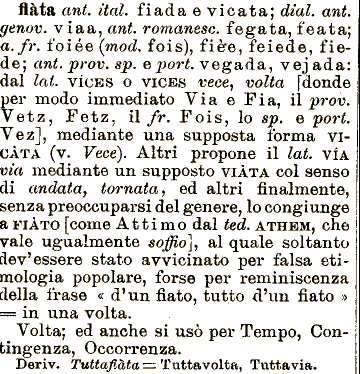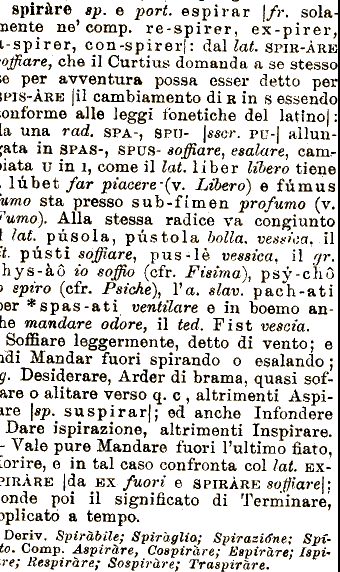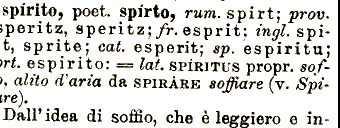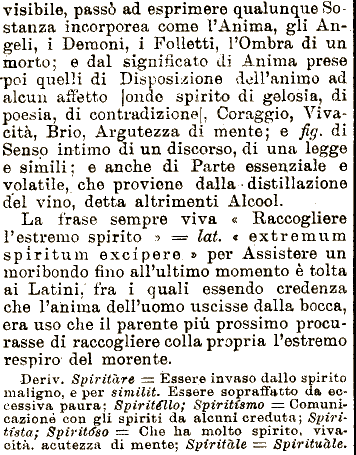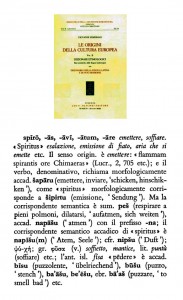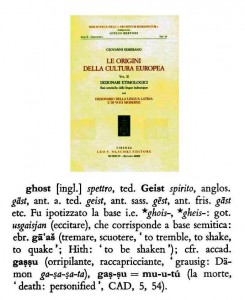L
ànema lè femena. L
ànemo lè mas.cio.
Anima e
Animus :
http://en.wikipedia.org/wiki/Anima_and_animuscueo ca scrive K.G.Jung so l ànema
animaThe whole nature of man presupposes woman, both physically and spiritually. His system is tuned into woman from the start, just as it is prepared for a quite definite world where there is water, light, air, salt, carbohydrates etc..
"Two Essays in Analytical Psychology" In CW 7: P. 188
The more remote and unreal the personal mother is, the more deeply will the son's yearning for her clutch at his soul, awakening that primordial and eternal image of the mother for whose sake everything that embraces, protects, nourishes, and helps assumes maternal form, from the Alma Mater of the university ot the personification of cities, countries, sciences and ideals
"Paracelsus as a Spiritual Phenomenon" (1942) In CW 13: Alchemical Studies P.47
A mother-complex is not got rid of by blindly reducing the mother to human proportions. Besides that we run the risk of dissolving the experience "Mother" into atoms, thus destroying something supremely valuable and throwing away the golden key which a good fairy laid in our cradle. That is why mankind has always instinctively added the pre-existent divine pair to the personal parents-the "god"father and "god"-mother of the newborn child-so that, from sheer unconsciousness or shortsighted rationalism, he should never forget himself so far as to invest his own parents with divinity.
"Psychological Aspects of the Mother Archetype" (1939) In CW 9, Part I: The Archetypes and the Collective Unconscious P.172
What can a man say about woman, his own opposite? I mean of course something sensible, that is outside the sexual program, free of resentment, illusion, and theory. Where is the man to be found capable of such superiority? Woman always stands just where the man's shadow falls, so that he is only too liable to confuse the two. Then, when he tries to repair this misunderstanding, he overvalues her and believes her the most desirable thing in the world.
"Women In Europe" (1927). In CW 10: Civilization in Transition. P. 236
The overdevelopment of the maternal instinct is identical with that well-known image of the mother which has been glorified in all ages and all tongues. This is the motherlove which is one of the most moving and unforgettable memories of our lives, the mysterious root of all growth and change; the love that means homecoming, shelter, and the long silence from which everything begins and in which everything ends. Intimately known and yet strange like Nature, lovingly tender and yet cruel like fate, 'oyous and untiring giver of life-mater dolorosa and mute implacable portal that closes upon the dead. Mother is motherlove, my experience and my secret. Why risk saying too much, too much that is false and inadequate and beside the point, about that human being who was our mother, the accidental carrier of that great experience which includes herself and myself and all mankind, and indeed the whole of created nature, the experience of life whose children we are? The attempt to say these things has always been made, and probably always will be; but a sensitive person cannot in all fairness load that enormous burden of meaning, responsibility, duty, heaven and hell, on to the shoulders of one frail and fallible human being-so deserving of love, indulgence, understanding, and forgiveness-who was our mother. He knows that the mother carries for us that inborn image of the mater nature and mater spiritualis, of the totality of life of which we are a small and helpless part.
"Psychological Aspects of the Mother Archetype" (1939) In CW 9, Part I: The Archetypes and the Collective Unconscious P.172
Since [in the Middle Ages] the psychic relation to woman was expressed in the collective worship of Mary, the image of woman lost a value to which human beings had a natural right. This value could find its natural expression only through individual choice, and it sank into the unconscious when the individual form of expression was replaced by a collective one. In the unconscious the image of woman received an energy charge that activated the archaic and infantile dominants. And since all unconscious contents, when activated by dissociated libido, are projected upon the external object, the devaluation of the real woman was compensated by daemonic features. She no longer appeared as an object of love, but as a persecutor or witch. The consequence of increasing Mariolatry was the witch hunt,.that indelible blot on the later Middle Ages.
Psychological Types (1921), CW 6. P.344
e so l ànemo
animus The conscious side of woman corresponds to the emotional side of man, not to his "mind." Mind makes up the soul, or better, the "animus" of woman, and just as the anima of a man consists of inferior relatedness, full of affect, so the animus of woman consists of inferior judgments, or better, opinions.
The Secret of the Golden Flower (1931) Commentary by C.G.Jung in CW 13: Alchemical Studies. P. 60
Eros is a superhuman power which, like nature herself, allows itself to be conquered and exploited as though it were impotent. But triumph over nature is dearly paid for. Nature requires no explanations of principle, but asks only for tolerance and wise measure. "Eros is a mighty daemon," as the wise Diotima said to Socrates. We shall never get the better of him, or only to our own hurt. He is not the whole of our inward nature, though he is at least one of its essential aspects.
Two Essays on Analytical Psychology, CW 7 (1957). "On the Psychology of the Unconscious" P.32f
For a woman, the typical danger emanating from the unconscious comes from above, from the "spiritual" sphere personified by the animus, whereas for a man it comes from the chthonic realm of the "world and woman," i.e., the anima projected on to the world.
"A Study in the Process of Individuation" (1934) In CW 9, Part I: The Archetypes and the Collective Unconscious. P. 559
The persona, the ideal picture of a man as he should be, is inwardly compensated by feminine weakness, and as the individual outwardly plays the strong man, so he becomes inwardly a woman, i.e., the anima, for it is the anima that reacts to the persona. But because the inner world is dark and invisible to the extraverted consciousness, and because a man is all the less capable of conceiving his weaknesses the more he is identified with the persona, the persona's counterpart, the anima, remains completely in the dark and is at once projected, so that our hero comes under the heel of his wife's slipper. If this results in a considerable increase of her power, she will acquit herself none too well. She becomes inferior, thus providing her husband with the welcome proof that it is not he, the hero, who is inferior in private, but his wife. In return the wife can cherish the illusion, so attractive to many, that at least she has married a hero, unperturbed by her own uselessness. This little game of illusion is often taken to be the whole meaning of life.
Two Essays on Analytical Psychology, CW 7 (1957). "The Relations between the Ego and the Unconscious" P.309
The discussion of the sexual problem is only a somewhat crude prelude to a far deeper question, and that is the question of the psychological relationship between the sexes. In comparison with this the other pales into insignificance, and with it we enter the real domain of woman. Woman's psychology is founded on the principle of Eros, the great binder and loosener, whereas from ancient times the ruling principle ascribed to man is Logos.
"Woman in Europe" (1927). In CW 10: Civilization in Transition. P.254
Whereas logic and objectivity are usually the predominant features of a man's outer attitude, or are at least regarded as ideals, in the case of a woman it is feeling. But in the soul it is the other way round: inwardly it is the man who feels, and the woman who reflects. Hence a man's greater liability to total despair, while a woman can always find comfort and hope; accordingly a man is more likely to put an end to himself than a woman. However much a victim of social circumstances a woman may be, as a prostitute for instance, a man is no less a victim of impulses from the unconscious, taking the form of alcoholism and other vices.
Psychological Types (1921). CW 6. P.805
The woman who fights against her father still has the possibility of leading an instinctive, feminine existence, because she rejects only what is alien to her. But when she fights against the mother she may, at the risk of injury to her instincts, attain to greater consciousness, because in repudiating the mother she repudiates all that is obscure, instinctive, ambiguous, and unconscious in her own nature.
"Psychological Aspects of the Mother Archetype" (1939). In CW 9, Part I: The Archetypes and the Collective Unconscious. P. 186
Every father is given the opportunity to corrupt his daughter's nature, and the educator, husband, or psychiatrist then has to face the music. For what has been spoiled by the father can only be made good by a father, just as what has been spoiled by the mother can only be repaired by a mother. The disastrous repetition of the family pattern could be described as the psychological original sin, or as the curse of the Atrides running through the generations.
Mysterium Coniunctionis (1955) CW 14: P. 232
It is a woman's outstanding characteristic that she can do anything for the love of a man. But those women who can achieve something important for the love of a thing are most exceptional, because this does not really agree with their nature. Love for a thing is a man's prerogative. But since masculine and feminine elements are united in our human nature, a man can live in the feminine part of himself, I and a woman in her masculine part. None the less the feminine element in man is only something in the background, as is the masculine element in woman. If one lives out the opposite sex in oneself one is living in one's own background, and one's real individuality suffers. A man should live as a man and a woman as a woman.
"Woman in Europe" (1927) In CW 10: Civilization in Transition. P. 243
Unconscious assumptions or opinions are the worst enemy of woman; they can even grow into a positively demonic passion that exasperates and disgusts men, and does the woman herself the greatest injury by gradually smothering the charm and meaning of her femininity and driving it into the background. Such a development naturally ends in profound psychological disunion, in short, in a neurosis.
"Woman in Europe" (1927) In CW 10: Civilization in Transition. P.245
As the animus is partial to argument, he can best be seen at work in disputes where both parties know they are right. Men can argue in a very womanish way, too, when they are anima - possessed and have thus been transformed into the animus of their own anima.
Aion (1951). CW 9, Part II: P.29
When animus and anima meet, the animus draws his sword of power and the anima ejects her poison of illusion and seduction. The outcome need not always be negative, since the two are equally likely to fall in love (a special instance of love at first sight).
Aion (1951). CW 9, Part II: P.338.30
Every man carries within him the eternal image of woman, not the image of this or that particular woman, but a definite feminine image. This image is fundamentally unconscious, an hereditary factor of primordial origin engraved in the living organic system of the man, an imprint or "archetype" of all the ancestral experiences of the female, a deposit, as it were, of all the impressions ever made by woman-in short, an inherited system of psychic adaptation. Even if no women existed, it would still be possible, at any given time, to deduce from this unconscious image exactly how a woman would have to be constituted psychically. The same is true of the woman: she too has her inborn image of man.
"Marriage as a Psychological Relationship" (1925) In CW 17: The Development of the Personality. P.338
Cuà - n italian - se spiega on fià de robe so Jung e i so studi so i archetipi, l'inconscio collettivo e individuale, i conceti de
Persona-Ombra- Anima-Animus- Sé:
http://it.wikipedia.org/wiki/Carl_Gustav_JungParké - dovarìsimo saverlo - ke
« Quanto più domina la ragione critica, tanto più la vita si impoverisce; ma quanto più dell’inconscio e del mito siamo capaci di portare alla coscienza, tanto più rendiamo completa la nostra vita »
(C. G. Jung, Ricordi, sogni, riflessioni, p. 366).
Elora : on fià ( tanto) de pì de
animus pa le dòne e on fiatenìn de
anima pa i òmeni... pa rivarghe a kel punto de la
via dell'individuazione indoe ke
Sophia e
Hermes - finalmente - i se darà la man.

)
)
